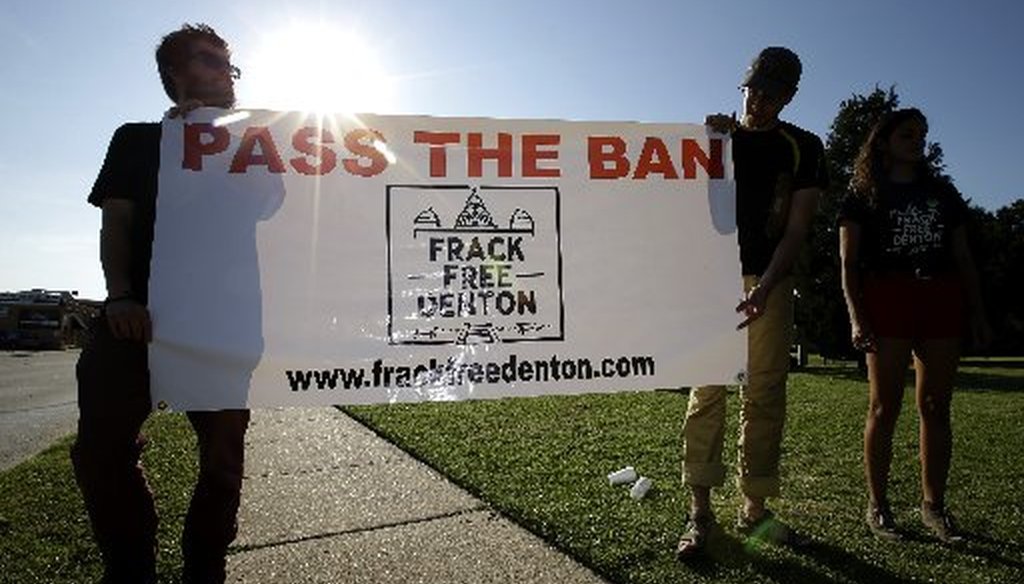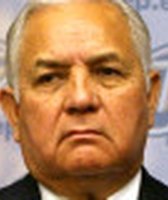Stand up for the facts!
Our only agenda is to publish the truth so you can be an informed participant in democracy.
We need your help.
I would like to contribute

Denton voters approved a ban on hydraulic fracking in the North Texas city. Texas lawmakers said such regulation belongs to state agencies, sending Gov. Greg Abbott a proposal making that clear, advocates said. (Associated Press photo, Tony Gutierrez).
Texas Gov. Greg Abbott is aboard with a proposal to prevent cities from regulating fracking--an idea that took form after Denton voters in 2014 barred hydraulic fracking in the North Texas city. Abbott is signing House Bill 40 into law.
We've done a little fact-checking of fracking claims. In fracking, to refresh, operators pump water and chemicals into the ground to release oil and natural gas. When those fluids come back to the surface, the wastewater is moved to a disposal well where it is pumped back deep into the Earth.
In 2012, we found Mostly True a declaration by then-Gov. Rick Perry that there'd been no proven instances of fracking causing groundwater pollution. However, the definition of fracking was debated -- and if we roped in all incidents that took place at such wells, there had been more than a few reported incidents of groundwater contamination.
We identified 11 incidents that appeared to be both substantiated by outside evidence and linked to an essential part of the process of hydraulically fracturing a well. The 11 included events such as fracking fluid leaking from wastewater pits or from pipe lining a fracked well. Several were "blowouts," which Engelder defined for us as the (normally controlled) process in which "high pressure gas blows fracking water out of the well to clear the way for natural gas production."
A few examples:
- February 2008, Parachute, Colo. -- A ProPublica news story says a state agency confirmed a 200-foot frozen waterfall of fracking fluid that melted into the Colorado River.
- August 2008, Dimock, Pa. -- A Vanity Fair news story says that after fracking began nearby, the state shut down water wells and fined a company $360,000 for "contaminating Dimock’s groundwater and failing to fix the leaks that caused the problem."
- April 2010, Caddo Parish, La. -- A ProPublica news story says parish residents were evacuated and told not to drink their water after a blowout at a nearby fracking well.
- November 2011, Leroy, Pa. -- A (Wilkes-Barre) Times Leader news story says an energy company confirmed that equipment failure allowed a 30,000-gallon spill of fracking fluid, some into a tributary of the Susquehanna River.
About two years later, PolitiFact in Washington, D.C., rated True a statement by MSNBC's Rachel Maddow that earthquakes led Dallas/Fort Worth International Airport to shut down a fracking well. Officials at the airport asked that a wastewater injection well be shut down, and after it was, the earthquakes of concern stopped. Seismologists linked the well to the earthquakes.
As summarized in a Fort Worth Star-Telegram news story, HB 40 would "expressly preempt the regulation of oil and gas operations by municipalities and other political subdivisions." Included: A four-part test for allowing cities to regulate operations above the ground, such as fire and emergency response, noise and setbacks. But the legislation states those controls must be "economically reasonable" and can’t hinder or "effectively prohibit" the work of a "prudent operator."
According to the story, to provide some comfort to cities with longstanding ordinances, such as Fort Worth, the measure includes a "safe harbor" provision that says any ordinance or other measure in effect for five years that has allowed drilling to take place should be considered commercially reasonable.
Read more here: http://www.star-telegram.com/news/business/barnett-shale/article20199849.html#storylink=cpy
Read more here: http://www.star-telegram.com/news/business/barnett-shale/article20199849.html#storylink=cpy
Our Sources
See the linked Truth-O-Meter stories.











































